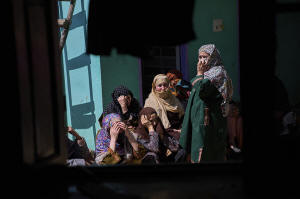Indian officials say troops exchanged fire with Pakistani soldiers in
disputed Kashmir
[April 25, 2025]
By AIJAZ HUSSAIN and RAJESH ROY
SRINAGAR, India (AP) — Indian and Pakistani soldiers briefly exchanged
fire along their highly militarized frontier in the disputed Himalayan
region of Kashmir, Indian officials said Friday, as tensions soared
between the nuclear-armed rivals following a deadly attack on tourists.
India has described the massacre in which gunmen killed 26 people, most
of them Indian, as a “terror attack” and accused Pakistan of backing it.
Pakistan denied any connection to the attack near the resort town of
Pahalgam in India-controlled Kashmir. It was claimed by a previously
unknown militant group calling itself the Kashmir Resistance.
With the region on edge, three Indian army officials said that Pakistani
soldiers fired at an Indian position in Kashmir late Thursday. The
officials, who spoke on condition of anonymity in keeping with
departmental policy, said Indian soldiers retaliated and no casualties
were reported.
Pakistan's Ministry of Foreign Affairs declined to comment on the
report.
Tensions rise
Tuesday’s attack in Kashmir was the worst assault in years targeting
civilians in the restive region. Since then, tensions have risen
dangerously between India and Pakistan, which have fought two of their
three wars over Kashmir, which is split between them and claimed by both
in its entirety.

On Wednesday, India suspended a crucial water-sharing treaty that has
withstood two wars between the countries and closed their only
functional land border crossing. A day later, India revoked all visas
issued to Pakistani nationals with effect from Sunday.
Pakistan responded angrily that it has nothing to do with the attack,
and canceled visas issued to Indian nationals, closed its airspace for
all Indian-owned or Indian-operated airlines and suspended all trade
with India. Nationals from both sides began heading back to their home
countries through the Wagah border near Pakistan’s eastern city of
Lahore on Friday.
Islamabad also warned that any Indian attempt to stop or divert the flow
of water would be considered an “act of war.” The suspension of the
water treaty could lead to water shortages at a time when parts of
Pakistan are already struggling with drought and declining rainfall.
Pakistan has also warned it could suspend the Simla Agreement — in what
would be a major and worrying step. The peace treaty signed after the
1971 India-Pakistan war established the Line of Control, a highly
militarized de facto border that divides Kashmir between the countries.
The United Nations has urged India and Pakistan “to exercise maximum
restraint and to ensure that the situation and the developments we’ve
seen do not deteriorate any further.”
“Any issues between Pakistan and India, we believe can be and should be
resolved peacefully, through meaningful, mutual engagement,” the
statement said Friday.
India and Pakistan each administer a part of Kashmir. New Delhi
describes all militancy there as Pakistan-backed terrorism. Pakistan
denies this, and many Muslim Kashmiris consider the militants to be part
of a home-grown freedom struggle.

[to top of second column]
|

Kashmiri villager women grieve as they sit outside the blown-up
family home of Asif Shiekh, a militant who officials say is involved
in the deadly attack on tourists in Pahalgam, at Monghama village in
Tral, south of Srinagar, Indian controlled Kashmir, Friday, April
25, 2025. (AP Photo/Dar Yasin)

Residents and police in southern Kashmir said Indian soldiers
detonated explosives in the family homes of two suspected militants
they accused of being involved in Tuesday’s attack. In the past,
Indian troops have demolished homes as a way to punish militancy in
Kashmir.
Authorities say they are investigating two local men and two
Pakistani nationals for their alleged involvement in the attack.
Officials have not elaborated or shared any evidence.
“He left home three years ago. We haven’t seen him since and nothing
was ever recovered from this house despite multiple raids,” said
Afroza, the aunt of one of the local men accused, Asif Sheikh. The
blast partially damaged the house in Monghama village that she
shares with Sheikh's parents and two sisters, including blowing out
its windows. It also shattered windowpanes of several other homes.
“Even if he had done the attack, why blow up the house of a poor
family,” Afroza, who like many women in Kashmir uses only one name,
said as she wailed.
A police official and two residents in Guree village said a house
there was also targeted by soldiers. The official insisted on
anonymity because he was not authorized to speak with media while
the two villagers feared reprisals from authorities.
Protesters take to the streets
Also Friday, hundreds of people rallied in Muzaffarabad, the capital
of Pakistan-administered Kashmir, to denounce the suspension of the
water-sharing treaty.

The demonstrators chanted slogans against Indian Prime Minister
Narendra Modi and burned his effigy before dispersing peacefully.
Similar small rallies were also held elsewhere.
Pakistan’s Senate condemned the attack, while passing a resolution
denouncing New Delhi’s attempt to link Islamabad to it and the
suspension of the water treaty.
Hundreds of demonstrators also took to streets in India’s capital of
New Delhi, where most markets were shut in protest against the
killings. They demanded action against Pakistan.
“Now our patience has run out,” protester Surekha Sharma said. “Now
we want revenge for this.”
___
Roy reported from New Delhi. Associated Press writer Munir Ahmed in
Islamabad contributed to this report.
All contents © copyright 2025 Associated Press. All rights reserved |